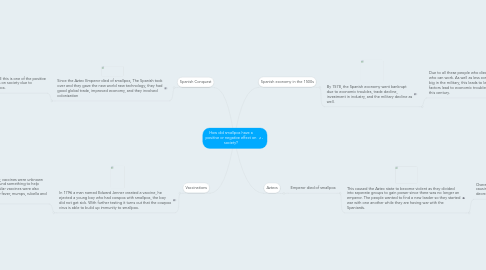
1. Spanish Conquest
1.1. Since the Aztec Emperor died of smallpox, The Spanish took over and they gave the new world new technology, they had good global trade, improved economy, and they involved colonization
1.1.1. Overall this is one of the positive effects on society due to smallpox.
2. Vaccinations
2.1. In 1796 a man named Edward Jenner created a vaccine, he ejected a young boy who had cowpox with smallpox, the boy did not get sick. With further testing it turns out that the cowpox virus is able to build up immunity to smallpox.
2.1.1. This situation is a positive effect on society, vaccines were unknown back in that time, and the fact that they found something to help such a serious disease was a big issue. Similar vaccines were also used to treat other diseases such as yellow fever, mumps, rubella and tetanus.
3. Spanish economy in the 1500s
3.1. By 1578, the Spanish economy went bankrupt due to economic troubles, trade decline, investment in industry, and the military decline as well.
3.1.1. Due to all these people who died due to smallpox, they have less people who can work. As well as less consumers to buy and trade. Smallpox was big in the military, this leads to less people in the military. All of these factors lead to economic troubles and trade decline. A negative effect on this century.
4. Aztecs
4.1. Emperor died of smallpox
4.1.1. This caused the Aztec state to become violent as they divided into seperate groups to gain power since there was no longer an emperor. The people wanted to find a new leader so they started war with one another while they are having war with the Spaniards.
4.1.1.1. Overall this is a negative effect for this century, causing war and violence within the country, and decreasing the population for this time period.
